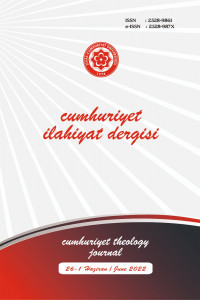Almanya’daki Okullarda Mezhebe Dayalı Verilen İslam Din Dersinden Velilerin Beklentileri: BadenWürttemberg Örneği
Expectations of Parents from Sect-Based Islamic Religion Lessons in Schools in Germany: The Baden-Württemberg Case
Author(s): Şenay YazganSubject(s): Education, Theology and Religion, Islam studies, Sociology of Religion
Published by: Cumhuriyet Üniversitesi İlahyat Fakültesi
Keywords: Religious Education; Islamic Religion Lesson; Baden Württemberg; Parents; Expectations;
Summary/Abstract: Religion lessons in Germany are given under the responsibilities of churches and religious communities with public legal personality, which are considered to be the addressed by the German state, according to Article 7(3) of the German Constitution. Since Muslims could not have the status of a religious community by uniting under a single umbrella organization in line with the relevant law, the Islamic religion course in accordance with the German Constitution could not be given until this time. For this reason, the problem of Muslims not being addressed as a religious community against the German state still continues to be an obstacle to Islamic religious lessons. With the introduction of sectarian-based Islamic religion course in Germany's public schools, the development and efforts to ensure that the lesson is both a lesson in accordance with the constitution and responding to the wishes and expectations of Muslims are important. Since the Islamic religion lesson is still in the process of formation, one of the most curious issues is what the Muslim families expect from the course. Therefore, in this study, it was aimed to determine the opinions and expectations of the parents of Turkish Muslim students who take this course, in the light of current practices, on the issues related to the operation and application of the course in Baden-Württemberg, one of the states of Germany, in the 2018/2019 academic year from 1-4th grades of public schools where the Islamic religion lesson is given as a pilot Project. The study is important in terms of revealing the current situation of the lesson and shedding light on the development of the lesson in accordance with the future wishes and expectations of the families. Qualitative research method was used in the research. Research data were collected by semi-structured interview technique consisting of open-ended questions. The study group of the research consists of 11 Turkish students' parents. In the research, the views and expectations of the parents were expressed with the help of the analysis categories in the form of lower and upper categories. Two analysis themes created in line with the content of the study are as follows: "ReligionState Relations", "Methodological and Didactic Foundations". Under the theme of “Religion-State Relations”, the categories regarding the current state of the state-run lesson within the scope of the pilot project, and by whom and how this lesson should be given in public schools; Under the theme of "Methodological and Didactic Fundamentals", the categories related to the content, purpose and application of the lesson, which concern how the lesson will be given in accordance with the interests and needs of the parents, are included. It is possible to express the most basic findings obtained within the framework of the analysis themes of the study as follows: It has been determined that the expectations of the parents within the scope of religion-state relations are that the Islamic religion lesson should be widespread in all schools and grade levels. In addition, it has been determined that the Islamic religion lesson is generally in accordance with the expectations of the parents, the parents are satisfied with the lesson because the lesson is given as a recognized right to Muslims in public schools, and the lesson makes significant contributions to the religious development of the students. The parents, who see the encounter of Muslim students with their own religion in the school environment as an opportunity and possibility, say that the Islamic religion course has an important effect both in the construction of the religious identity of the Muslim community and in the development of human relations with those of other religions in the German society, therefore, they expressed their expectations that the course should be developed and disseminated in all schools and grade levels. Under the theme of views on methodological and didactic foundations, based on the views of the parents, the Islamic religion lesson; it has positive effects on students by encouraging them to explain, share, learn and practice their religion; It has been determined that the lesson has effects that enable students to be more conscious and increase their religious interest and sensitivity. In addition to these positive features of the lesson, the basic views within the scope of expectations from the lesson; that the content of the lesson should be developed and elaborated in line with the religious interests and needs of the students. It has been seen that the views of the parents are mainly in the direction of deepening the subject areas of the course, making the course focused on knowledge and worship, the course should give students religious responsibility, and the course should be given with the aims of raising religious individuals. In the study, evaluations were made about at which points the Islamic religion lesson is suitable for the expectations of the parents and at which points it should be made appropriate. Considering the results of this research, the structure and program of the Islamic religion lesson given in Germany can be developed in cooperation with academics from both Turkey and Germany in a way that can meet the religious interests and needs of Muslims in line with their religious perceptions and religious education expectations, within the framework of religion-state relations.
Journal: Cumhuriyet İlahiyat Dergisi
- Issue Year: 26/2022
- Issue No: 1
- Page Range: 375-393
- Page Count: 20
- Language: Turkish

